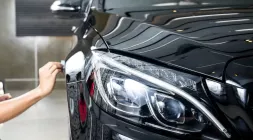Get Your Car Ready for the Summer Heat
Handy guide in preparing your car for summer!
It's only a few months before summer, and the first things that always come to mind about summer are vacation and beach. Summer is one of the most anticipated time of the year, but it can also have a negative effect.
The heat in the Philippines in this time of year is unlike any other, but we have somehow already grown accustomed to that. However, if you're a vehicle owner, you may be worried about keeping your car cool. While we can be comfortable just by resting under a shade with cool air, our cars, on the other hand, will need more that.
To help you enjoy the summer without having to worry about your vehicle breaking down due to heat intolerance, Philcarnews.com prepared a checklist so you can get your vehicle ready even before summer starts.
1. Check your fluids
Before the summer heat kicks in, make sure all fluid elements of your car is at the amount it should be. The summer heat will be merciless, and this will put extra strain on your engine to work the wheels. There are different kinds of fluid that make your car trip run smoothly, and they will need to be inspected every now and then. So before summer even starts, be sure to check the following fluid elements in your engine and to refill or replace contents if necessary.
- Engine Oil
- Transmission Fluid
- Power Steering
- Brake Fluids
These liquid elements usually have gauges on them or level markers. This will let you know how much fluid is left until you need to worry about putting too much strain on your car. The refill instructions and information as to how frequent these elements should be changed will be indicated in your car's respective manual. Taking advice from friends is fine, but your manual should be your only reference regarding your car's engine fluids. However, even if you do follow the manufacturer's instructions well, the harsh weather conditions can still triple the strain inflicted on your car. As a solution, we suggest you check your fluid gauges from time to time and refill the corresponding container before the fluid drops below the indicated danger level.

Before the summer heat kicks in, make sure all fluid elements of your car is at the amount it should be
2. Check your tires.
The added strain that the overwhelming heat that summer brings isn't only seen in the liquid elements that make the vehicle run. The tires are also one of the usual parts that suffer greatly from this. They tread on roads and asphalt that's been heated in the sun while they're also exposed to hot weather. Excessive exposure to an extremely hot environment can contribute to degrading your car's tire quality and help it wear out faster.
One of the obvious signs that your tires are affected by the heat is the appearance of blister-like bumps on the side of the rubber. This usually calls for immediate replacement before it causes a skid. You should also check for tread wear when inspecting your tires. It's when your tires are almost smooth, and they're no longer safe for driving due to reduced traction.

The tires are one of the usual parts that suffer greatly from the overwhelming heat of summer
3. Check the exterior lights to make sure they all work
The bright sunlight can lessen the visibility of your signal and warning lights, especially at noon time where the sun is highest. If your turn signals or warning lights are broken, have them repaired or replaced immediately. Informing other drivers that you'll be making a turn or stopping is crucial to road safety.

If your turn signals or warning lights are broken, have them repaired or replaced immediately
4. Check the battery
Inspecting the battery is easy, and it doesn't require any important tools or skills. Just make sure that the engine is cool enough for you to access the battery without burning yourself. Start by popping the hood and the small, rectangular battery should be very easy for you to recognize. Inspect the battery if it has leaks, a cracked case, traces of rust, dirt or corrosion.
If you see signs of leakage anywhere on the battery, this is an indication that you need to replace it immediately. If your car battery is only dirty, then a little clean up could be all that it needs. Start by disconnecting the clamps by removing the negative cable first. Then brush away using a homemade paste made of baking soda and water. Then use an old brush to scrub the dirt away.

Inspect the battery if it has leaks, a cracked case, traces of rust, dirt or corrosion
5. Check the brakes
There are different types of brakes that are used in cars. Yours will have corresponding instructions as to its inspection and maintenance in the manual. You can also find information there that will identify if your brakes are drum brakes, disc brakes or so. If you lost your manual or you simply aren't savvy with car brakes, you can simply take your car to the nearest auto repair shop. Have them checked, especially if you plan to take your vehicle to drive on steep hills and sandy beaches where brakes should be most dependable.
6. Check your spare tire and jack
Like the wheels you have on your car right now, your spare also loses air. Having it checked everyone in a while can help save you from the disappointment of not having a spare when you need it. Try to have it pumped with air, every time you get the rest of your wheels treated. Have them checked every time you refuel as well.
Also, make sure that your jack is in the best state. You wouldn't want to have a flat tire incident and then fail to address it due to your lack of capable tools. Squeeze in some oil to get into its rusty parts for lubrication and make sure you store it together with the lug wrench and other external car repair supplies.

Like the wheels you have on your car right now, your spare also loses air
7. Air Conditioner
Air conditioning is a necessity in all vehicles, and you would appreciate them more when the summer months start to roll in. To keep your AC system in great condition for summer, make sure you wipe the vents every once in a while to keep dirt from entering the internal system. To prevent ailments like colds, allergies and flu, clean your AC every time it gets too dusty.
>>> Click to get more helpful tips and advice for your car maintenance
Tag:
car maintenance tipsRECENT ARTICLES








